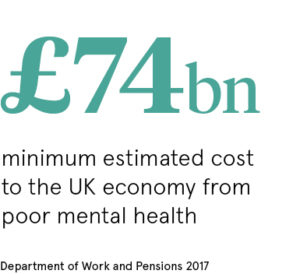The importance of employees’ mental health is finally being championed by MPs at Westminster. On January 17, the House of Commons facilitated a debate on first aid for mental health during which a cross-party group of MPs tabled a motion to supplement existing legislation to place mental and physical first aid on equal footing.
This motion received overwhelming support and, if subsequently successful, it would require all businesses to implement suitable infrastructure to support those experiencing mental health difficulties. Currently, the Health and Safety Executive’s first aid guidance only encourages employees to think about mental health and wellbeing needs.
Poor mental health is said to cost the UK economy between £74 billion and £99 billion a year according to a government report, with a direct cost to employers estimated at between £33 billion and £42 billion. It is therefore no surprise that numerous campaigns are raising the profile of mental health through a focus on awareness, education and support.
Caring for mental health particularly important for graduates
The importance of mental wellbeing for early-career employees is stark. Research from City Mental Health Alliance (CMHA) shows that 62 per cent of recent graduates are said to be worried about the potential impact of a new role on their mental health.
 Such feelings are echoed by Kasia Jazeel, who recently joined PwC through a graduate scheme. She says: “It is important for young people to prioritise mental health during periods of change and stress that come with employment. It’s easy to get caught up in the demands of a graduate job and neglect wellbeing.”
Such feelings are echoed by Kasia Jazeel, who recently joined PwC through a graduate scheme. She says: “It is important for young people to prioritise mental health during periods of change and stress that come with employment. It’s easy to get caught up in the demands of a graduate job and neglect wellbeing.”
Business culture carries the reputation of being highly pressured with long working hours. Pressing demands from clients filter down to staff whose capacities are pushed to their limits. Currently, those who can manage a monumental workload are judged as performing positively within their roles as employees. However, with a workforce increasingly mindful of wellbeing, traditional models of performance may require some revision.
Within graduate circles there exists a presumption that staying late and working yourself beyond your limits are indicators of a good employee, especially one who wishes to rise through the managerial ranks. However, Ms Jazeel outlines that firms should set targets in a range of areas beyond the immediate quantity of completed work tasks.
She says this would encourage employees to develop themselves “beyond their desks”, ensuring they do not work so many hours than is “realistic and healthy”.
Current concept of “performance” needs to be rethought
Promoting a more holistic understanding of performance is a prerequisite to encouraging a healthier and more sustainable method of working. It is important to debase the concept from being solely measured against task completion and to encourage employees to ensure they look after themselves as well as their work.
However, a more rounded measure of performance cannot exist in isolation. Alongside this it is necessary for employers to develop and implement a sustained mental health policy, inclusive of awareness, education and support, for all staff. Graduates are said to be 83 per cent more likely to apply to a firm that is open about its commitment to mental health, a CMHA survey shows, demonstrating the increasing need for formalised and institutionalised approaches to wellbeing.
There exists a presumption that staying late and working yourself beyond your limits are indicators of a good employee
Evidently, there’s an expectation of employers to be open about their mental health policies and support infrastructure, which may come as a surprise to corporations embodying a traditional business culture where promotion of positive mental wellbeing may not fall into their immediate strategic remit. With significant demands from a workforce increasingly conscious of mental health, businesses must make a choice: adapt to current wellbeing needs or be left behind.
How can organisations start prioritising mental health?
Rather than viewing wellbeing strategies as impossibly daunting, it is integral to bringing current and future business leaders together to support one another in crafting and sustaining mentally healthy workplaces. Networks, such as Thriving from the Start, look to facilitate such discussions through connecting graduates, school-leavers and apprentices with business leaders.
By sharing their concerns, early-career employees can identify key themes across corporate sectors and, in addition, are then able to communicate with senior management. Such infrastructure supports employers and employees, ensuring a positive approach to mental health in which no one is left unsupported.
Wellbeing and mental health programs can lead to gains long-term
In the short term, businesses may fear that increasing discussions around mental health and wellbeing will lead to a dip in productivity with less time spent working equated to less tasks being completed. However, employers should consider the medium and long-term benefits of time spent bettering the wellbeing of employees, who will be well placed to develop healthy working habits, so they can work mindfully over a longer period.
Avoiding risks such as burn-out, stretching capacities beyond their feasible limits or high turnover of staff, if firms look to change their culture around mental health and encourage staff to take time for themselves, we are likely to see benefits as employees work more efficiently when sat at their desks. This will, no doubt, help employers and employees to maintain their work-life balance in a more effective manner, the benefits of which will expand beyond the workplace to families, communities and wider society.
No matter the firm’s reputation or size, conversations around mental wellness are key to bringing the best out of employees at all levels. Shaping a culture in which all employees can feel comfortable with seeking support, in whatever form it may be, is necessary and vital to ensure mentally healthy and open workplaces now and in the future.

